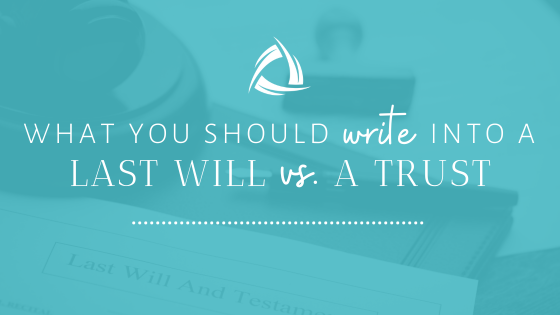The words last will and trust get thrown around quite a lot when estate planning, and while many have a blanket understanding of what they mean, it is crucial to go into estate planning with a solid foundation of education on what to expect when meeting with an attorney. Last wills and trust oftentimes get bundled together, and some might not understand the vast differences between the two, but these two documents provide different benefits depending on what you are utilizing them for. So, let’s dive into both forms and see how each provides its own advantages to the estate planning process.
What Goes Into a Last Will?
A last will is seen as a more simple document. It will not have the bells and whistles a trust might, but it still covers a very important estate planning process. Within a last will, you will write in guardianship over children or pets, designate where assets should go, and detail desired final arrangements.
A will is ideal for those with young children or grandchildren who have specific wishes after their passing. Additionally, a last will is effective after one’s passing and will not protect your assets if you become incapacitated. Any wishes and asset distribution choices will happen afterward. Unfortunately, last wills are also liable to go through probate, which can be seen as a long and expensive process for the family involved.
What Goes Into a Trust?
Moving on to a trust, you will find that this is a more complicated document and process than a last will, as there are many pieces that go into it, such as beneficiaries, financial documents, and asset allocation. A trust will provide you more control over when and how your assets are distributed and come in many different forms and types, such as irrevocable and revocable. Trusts will usually include someone’s life insurance, property, businesses, bank accounts, financial assets, and any larger assets to ensure their protection.
A trust is ideal for someone who wishes to have their assets passed down while they are still alive and wants to take advantage of the possible tax benefits. Additionally, trusts will avoid probate and keep your assets safe from someone contesting your choices. A trust is effective the moment you sign it and will often take precedence over last wills while protecting your assets if you become incapacitated.
Can You Have Both a Last Will and a Trust?
The short answer: Yes, you can have both a last will and a trust implemented in your estate plan. Both come with their own benefits, and depending on your life and wishes, they might be useful when planning for your family’s life after you are gone. Essentially, a last will is there to name guardianship for your children and declare your last wishes, while a trust can manage and distribute your assets – both can become necessities.
How to Ensure Your Last Will and Trust Are Solid
While one is declared simpler than the other, writing out a last will or a trust can be challenging. Both come with their own list of legalities to uphold. Doing this alone can lead to holes in the documents and proper steps not being taken. If you want to ensure your last will and trust are solid and fully prepared for your passing, it is wise to seek out an estate planning attorney. Partnering with an estate planning attorney can help you better decide which plans are right for you and properly allocate your assets. If you want your family to be protected, an attorney is essential.
If you have further questions on a last will or trust or want to start your estate planning process, contact the team at Hartmann Law.

